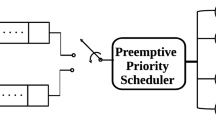Abstract
This paper deals with the optimal Call Admission Control (CAC) problem in DS-CDMA cellular network supporting multiple traffic types with different Quality of Service (QoS) requirements. We present a general analysis framework to solve the problem, that is, Generalized semi-Markov Decision Process (GSMDP). It discards any restrictive unrealistic assumptions and therefore can be applied to any complex cases including non-Markovian environment. Besides, incorporating a weighted linear function of new call and handoff call blocking probabilities for each service type, we attain the goal of maximizing network revenue while minimizing the blocking probabilities. Finally, through a form of reinforcement learning algorithm known as Q-learning, the optimal policy is worked out with requiring neither explicit state transition probabilities nor any assumptions behind the network model.
Preview
Unable to display preview. Download preview PDF.
Similar content being viewed by others

References
Singh, S., Krishnamurthy, V., Poor, H.V.: Integrated Voice/Data Call Admission Control for Wireless DS-CDMA Systems. IEEE Transactions on Signal Processing 50, 1483–1495 (2002)
Lindemann, C., Lohmann, M., Thmmler, A.: Adaptive Call Admission Control for QoS/Revenue Optimization in CDMA Cellular Networks. Wireless Networks 10, 457–472 (2004)
Jeon, W.S., Jeong, D.G.: Call admission control for CDMA mobile communicationssystems supporting multimedia services. IEEE Transactions on Wireless Communications 1, 649–659 (2002)
Li, B., Li, L., Li, B., Sivalingam, K.M., Cao, X.-R.: Call Admission Control for Voice Data Integrated Cellular Networks - Performance Analysis and Comparative Study. IEEE Journal on Selected Areas in Communications 22, 706–718 (2004)
Fang, Y., Chlamtac, I., Lin, Y.-B.: Channel Occupancy Times and Handoff Rate for Mobile Computing and PCS Networks. IEEE transactions oncomputers 47(6), 679–692 (1998)
Xi-Ren, C., Yu-Chi, H.: Models of Discrete Event Dynamic Systems. IEEE Control Syst. Mag. 10, 69–76 (1990)
El-Alfy, E.-S., Yao, Y.-D., Heffes, H.: A learning approach for call admission control with prioritized handoff in mobile multimedia networks. In: IEEE Vehicle Technology Conference (VTC), Greece, pp. 972–976 (2001)
Tong, H., Brown, T.X.: Adaptive Call Admission Control Under Quality of Service Constraints: A Reinforcement Learning Solution. IEEE Journal on Selected Areas in Communications 18, 209–212 (2000)
Younes, H.L.S., Simmons, R.G.: A formalism for stochastic decision processes with asynchronous events. In: The AAAI Workshop on Learning and Planning in Markov Processes-Advances and Challenges, San Jose, CA, pp. 107–110. AAAI Press, Menlo Park (2004)
Watkins, C.J.C.H., Dayan, P.: Q-learning. Machine Learning 8, 279–292 (1992)
Yu, F., Wong, V.W.S., Leung, V.C.M.: A New QoS Provisioning Method for Adaptive Multimedia in Cellular Wireless Networks. In: Proc. IEEE INFOCOM 2004, HongKong, PR China (2004)
Senouci, S.-M., Beylot, A.-L., Pujolle, G.: Call admission control in cellular networks: a reinforcement learning solution. International Journal of Network Management 14, 89–103 (2004)
Author information
Authors and Affiliations
Editor information
Editors and Affiliations
Rights and permissions
Copyright information
© 2005 Springer-Verlag Berlin Heidelberg
About this paper
Cite this paper
Chen, W., Lei, F., Wang, W. (2005). A General Framework for Analyzing the Optimal Call Admission Control in DS-CDMA Cellular Network. In: Gervasi, O., et al. Computational Science and Its Applications – ICCSA 2005. ICCSA 2005. Lecture Notes in Computer Science, vol 3481. Springer, Berlin, Heidelberg. https://doi.org/10.1007/11424826_86
Download citation
DOI: https://doi.org/10.1007/11424826_86
Publisher Name: Springer, Berlin, Heidelberg
Print ISBN: 978-3-540-25861-2
Online ISBN: 978-3-540-32044-9
eBook Packages: Computer ScienceComputer Science (R0)



